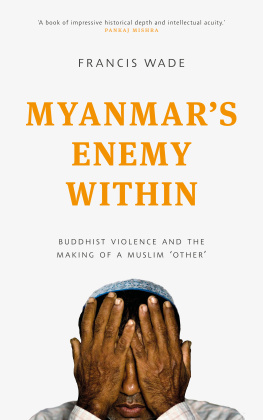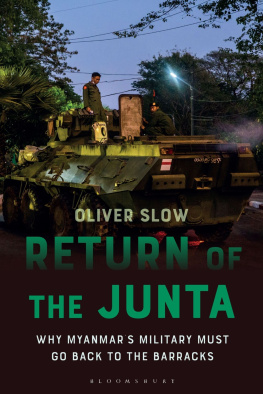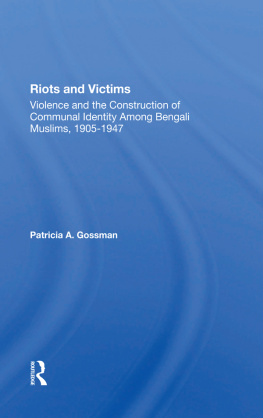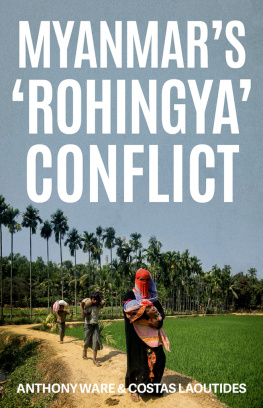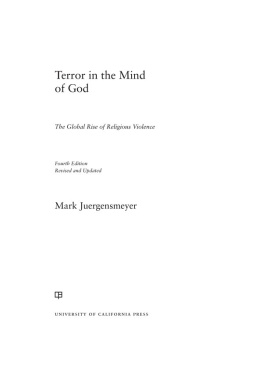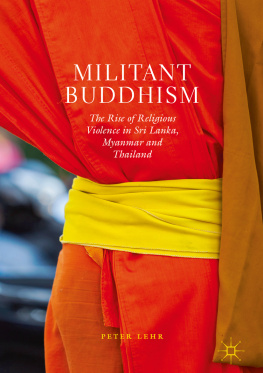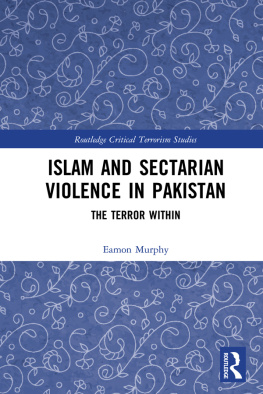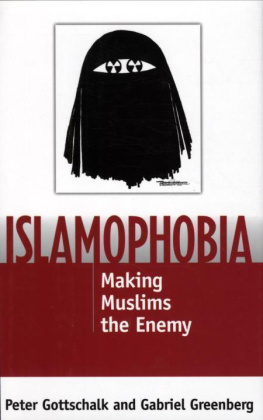Praise for Myanmars Enemy Within
A book of impressive historical depth and intellectual acuity. Francis Wade shatters many clichs about religious violence as he explores its tangled roots in Buddhist Myanmar.
Pankaj Mishra, author of Age of Anger: A History of the Present
Francis Wade has invested immense energy in pursuit of the truth about the tragedy of Myanmar and its Muslim population. There is no other writer on this topic with the same moral courage and intellectual insight. His work demands serious attention.
Fergal Keane, BBC Correspondent and author of Road of Bones: The Epic Siege of Kohima
This gripping investigation into the plight of Myanmars Muslim community reads like a forensic case history, uncovering the full extent of a nations festering wound. Lucid, compassionate, admirably researched and reasoned, here is scholarly reportage at its best.
Wendy Law-Yone, author of Golden Parasol: A Daughters Memoir Of Burma
Elegantly written, empirically rich, and analytically nuanced, the book combines in-depth, on-the-ground reportage with a solid command of the scholarship. An excellent book.
John T. Sidel, LSE, and author of Riots, Pogroms, Jihad: Religious Violence in Indonesia
A fine, engrossing work, at the centre of which is that all too common enmity and conflict between people of different religious and ethnic adherences.
Paul Brass, author of The Production of Hindu-Muslim Violence in Contemporary India
Asian Arguments
Asian Arguments is a series of short books about Asia today. Aimed at the growing number of students and general readers who want to know more about the region, these books will highlight community involvement from the ground up in issues of the day usually discussed by authors in terms of top-down government policy. The aim is to better understand how ordinary Asian citizens are confronting problems such as the environment, democracy and their societies development, either with or without government support. The books are scholarly but engaged, substantive as well as topical and written by authors with direct experience of their subject matter.
Series Editor: Paul French
Previous Titles:
North Korea by Paul French
Ghost Cities of China by Wade Shepard
Leftover Women: The Resurgence of Gender Inequality in China by Leta Hong Fincher
Chinas Urban Billion by Tom Miller
A Kingdom in Crisis: Thailands Struggle for Democracy in the Twenty-First Century by Andrew MacGregor Marshall
China and the New Maoists by Kerry Brown and Simone van Nieuwenhuizen
Forthcoming:
Thailand: Shifting Ground between the US and a Rising China by Benjamin Zawacki
On the New Silk Road: Journeying through Chinas Artery of Power by Wade Shepard
Last Days of the Mekong by Brian Eyler
Hong Kong: Markets, Street Hawkers and the Fight against Gentrification by Maurizio Marinelli
Myanmars Enemy Within
Buddhist Violence and the Making of a Muslim Other
francis wade
Myanmars Enemy Within: Buddhist Violence and the Making of a Muslim Other was first published in 2017 by Zed Books Ltd, The Foundry, Oval Way, London SE RR, UK.
www.zedbooks.net
Copyright Francis Wade 2017
The right of Francis Wade to be identified as the author of this work has been asserted by him in accordance with the Copyright, Designs and Patents Act, 1988.
Typeset in Bembo Std by Swales & Willis Ltd, Exeter, Devon
Cover design by Emma J. Hardy
Cover photo Nic Dunlop/Panos
All rights reserved. No part of this publication may be reproduced, stored in a retrieval system or transmitted in any form or by any means, electronic, mechanical, photocopying or otherwise, without the prior permission of Zed Books Ltd.
A catalogue record for this book is available from the British Library.
ISBN -- 78360 -- hb
ISBN -- 78360 -- pb
ISBN -- 78360 -- pdf
ISBN -- 78360 -- epub
ISBN -- 78360 -- mobi
For my mother and father, whose love and support underpins all this.
Contents
Numerous people have helped, from near and afar, with the research and writing of this book. The characters featured in these pages, who form the backbone of the story Ive tried to tell, were often approached in roadside teashops or at the doorways of their homes, unaware they would be drawn into a conversation of a deeply personal, and sometimes painful, nature. But all were generous with their time and thoughts, and I owe a great debt to them.
Friends and colleagues offered valuable feedback on structure and content, and plugged important gaps in my reading of the events documented in these pages. In particular I am grateful to Carlos Sardia Galache, Matthew Schissler, Aung Tun, Elliott Prasse-Freeman, Sai Latt, David Mathieson, Matthew Walton, Maung Zarni, Taylor OConnor and Charlie Campbell for their input on key, and complex, topics. At Zed Books, Kim Walker and Paul French provided useful advice on drafts, and patiently postponed the deadline more than once. Chris Lewa has, since I first began exploring this issue, kindly provided invaluable material and information, and I am lucky to have been able to bounce ideas around with the team at the International State Crime Initiative Penny Green, Thomas McManus and Alicia de la Cour-Venning whose own research has been vital to informing my own.
Some of the content of this book, particularly in Chapters , and , drew on reporting I had undertaken for TIME , Los Angeles Review of Books , The Irrawaddy and ucanews.com. I am grateful for their permission to rework the material in here. Elsewhere, firsthand accounts I collected of the violence and its aftermath were furnished with information from reports published by Human Rights Watch, Fortify Rights, Amnesty International and Physicians for Human Rights, all of which have carried out important research into the events of recent years.
Many thanks to those in Yangon and elsewhere in the country who gave crucial contributions to this book that cannot be acknowledged in its pages Sophia Naing, Harry Myo Lin, U Soe Oo and Saw Nang in particular. In Yangon, Sam Aung Moon provided important translations, often sitting patiently through inordinately long interviews. Ali Fowle has been endlessly helpful over the years, somehow weathering my incessant pestering, while Joseph Allchin has provided a wealth of thoughts and ideas. I am also grateful to the staff at the Democratic Voice of Burma, where I joined as a journalist in 2009 and, in time, came to learn a great deal from colleagues there, many of whom had fled from the very same system of oppression and the horrors it brought that I would report on in the years afterwards. My experience there provided a foundation for all that followed.
Yetike and KH have been vital to my understanding of Myanmar, and have sacrificed a great deal of their time to translate, to guide, to support, to provide an intellectual crutch it goes on. Their grasp of the murky politics of their country has greatly strengthened my own, and without their generosity and friendship this book would have been that much harder to complete.
I owe a great debt to friends and family across the world who have provided much-needed support and a welcome distraction throughout. Ive been groaning about this project for too long, and now Ill finally stop. Above all else, my mother and father, Kristin Wade and Malcolm Andrews, have, since long before I learned to pick up a pen, taught me to look, to listen and to question. And, eventually, to write. They were present throughout this book, steering me through a testing year and more, and offering the finest advice on drafts. Words cannot express how grateful I am for this and everything else they have done.

